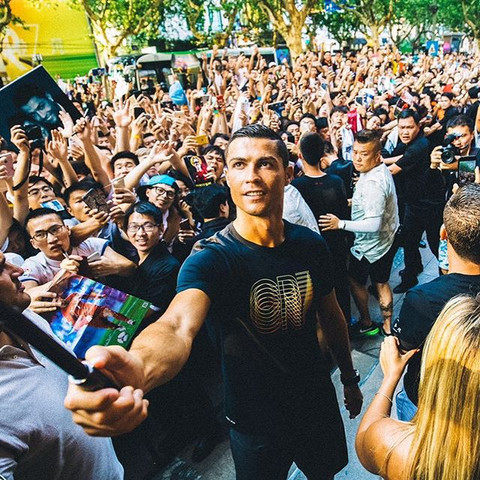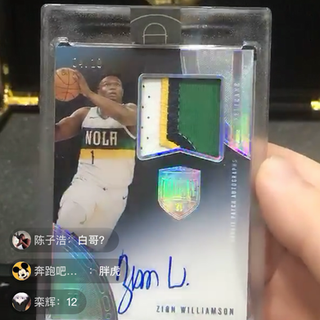Panini Leads China's Trading Card Revolution
- Gideon Clark

- Mar 18, 2021
- 7 min read
Updated: Mar 19, 2021
Card collecting culture has exploded onto the mainstream. Once a niche hobby, a market relegated to eBay message boards and annual card-cons, it’s now part of the mainstream for sports fans, investors, celebrities and all the cool kids in between.
But has the culture hit China yet? Yes.
China has fast become the new frontier for card collecting, asserting itself as one of the fastest-growing markets in the industry. According to eBay’s “State of Trading Cards” report, China trailed only Australia’s growth, increasing the number of sales by 205% in 2020.
Here we explore why.
Sports and star power are universal
Passion for sports transcends culture and the stars are global. No matter where you call home, you can feel a connection with the greatest professional athletes in the world and across generations.
As international leagues have grown in popularity in China, star players are the force driving fandom. Chinese fans often support more than one team and often prefer to follow a player over a team. It’s that exact star power that drives the market for trading cards.
The biggest athletes in the world regularly visit China as brand and league ambassadors. LeBron James delights China almost annually, having made 15 appearances. Kobe Bryant visited China for 16 consecutive years before his untimely passing.

The biggest European soccer clubs participate in annual summer tournaments and friendlies to gain more exposure in China. But the fans follow the stars. In just 1 week after Cristiano Ronaldo’s transfer to Juventus from Real Madrid, Juventus gained approximately 308,000 new followers across their China social media channels, while Real Madrid lost 8,000 followers. One of Ronaldo’s first moves after joining his new club was to participate in a China summer tour for his “CR7” Nike brand to strengthen his connection with fans.
There may not be another market that idolizes star athletes as much as China, making it a fertile ground for card collecting culture to grow.
Collecting feeds China’s ‘Brand’ culture
China is the #1 luxury market in the world as the biggest brands drive consumption. Just like owning the latest iPhone in China, showing off your Kobe Bryant card now gives you status.
China is the biggest sports apparel market with the world’s most iconic brands leading the demand. For Nike, the company whose entire marketing strategy is built around the athlete, China was the company's fastest-growing region in 2020, jumping by 24% compared to 2019.
Fanatics, the sports merchandise company, just announced they are forming a joint venture with investment firm Hillhouse Capital, to build out a billion-dollar business in China. A major sign that demand for global sports brands is only now beginning to be served.
Spending on designer brands dovetails with the collecting culture. Just like the massive sneakerhead market that trades limited edition shoes, card collecting is showing similar growth trajectories.
Sneaker reselling in China is not only a hobby, but a huge business catching the eyes of investors worldwide. StockX, the American sneaker resale platform, had 10% of their global transaction volume coming from China, so they integrated localized language and payment support options into their platform. GOAT also made a move into the market by launching a WeChat Mini Program in 2019 to have a direct touchpoint with Chinese sneakerheads.
GOAT’s WeChat Mini-program in Global (left) vs its Chinese app (right). Branding and content are all identical, but the Mini-program offers support in the local language.
Local applications, like Poizon and Nice, have been developed strictly for the purpose of reselling shoes in China and have amassed large followings of 10M MAUs. Poizon’s valuation was also set at over US$1B in late 2019, and StockX CEO, Scott Cutler, confirmed that the resale market in China exceeds US$1B. (Source: Bloomberg)
All this activity and interest is driven by the power of the brands, whether it’s a pair of Air Force 1s or a Zion Rookie card, collecting culture fits China’s obsession with brands.
It’s big business
If China isn’t leading a trend, it’s usually not far behind. While demand for trading cards has skyrocketed in America, collectors in China are also after the most sought-after cards as investment opportunities that drive the industry.
The world's best trading card companies have been doing business in China for years, and more recently expanded operations to meet demand.
The first trading card distributors in China began around the late 1990s, but it wasn’t until the late 2000s that some rose to prominence by securing deals with Upper Deck, Topps and later on with Panini. While hobby stores still rely on distributors to import foreign products, in recent years brands are setting up their own direct-to-consumer channels.
Panini America launched its own ecommerce platforms, selling products on Tmall and WeChat. This dedicated direct-to-consumer model, coupled with an existing distribution network, has led to Panini emerging as the clear leader within the China market.
As an exclusive manufacturer of trading cards for some of the most popular leagues in China, Panini is poised to continue growing the market with its NBA, EPL, NFL, and soon-to-be UFC cards. In just 18 months, Panini has amassed close to one million followers in China across its three social media channels, establishing the brand in China’s collecting community.
Panini’s booth in the NBA Section at Sneaker Con 2020 Shanghai
Some distributors such as Ruika, a Shanghai-based company, have organized events in China, connecting distributors, stores, and enthusiasts. Leading players like Panini are now present in large-scale consumer-facing events like Sneakercon China, cross-marketing with the sneaker communities.


Similar to the Sneaker market with sizable reseller applications growing, the card market now has specialized, secondary markets and resale platforms, such as Katao and TC Up. There are now dedicated spaces for collectors to buy, sell, and trade their cards online. While eBay is still the popular choice for collectors, more cards are being listed in China, with an estimated 50-60% sales growth in 2020 for domestic resales. In an interview with leading industry stakeholders, the resale market size was 300-400M RMB ($46-62M USD) for 2020, and is projecting more growth in 2021.
Ecommerce livestreams is a popular format where Chinese consumers can learn about and purchase cards. An estimated 50-75 new online hobby stores have opened in the last year across China’s ecommerce platforms, and they livestream constantly to host casebreaks and showcase products that they sell to viewers. As these streamers gain more popularity and momentum, their reach and impact on the sports community will continue to expand.
Left to Right: Douyin livestream, with an influencer. 2 images from Kado, a Mini Program that was developed solely for the purpose of live streaming casebreaks and selling trading cards.
Influencers are also beginning to show interest - Canadian-born Hong Kong actor and fashion mogul Edison Chen recently posted to Instagram about his excitement to receive Panini NBA cases. His influence in China is massive, known for introducing hip-hop lifestyle to mainstream entertainment. His Weibo is approaching 30M followers, and his interest in trading cards will soon be influencing his fans to follow the booming hobby.
What’s next? Looking forward, there are a few trends worth monitoring.
Trading card brands will continue to expand their channels
The D2C model will grow across the industry. Competitors of Panini, foreign and domestic, will create products specifically for China and sell them directly to end-users through their own channels and third-party platforms.
Growing communities as Chinese influencers take part
The collecting culture will flourish like the sneaker community did before. Now, sneaker collecting KOCs (Key Opinion Consumers) and social media pages have amassed large followings and fame for their ability to create content about the sneaker lifestyle. As card collecting permeates through China, there will be others who specialize in card collecting to influence the masses.
China's domestic rights will drive new value
There will be increased competition for licenses to manufacture high-quality cards for the domestic sports IPs in China and Asian sports. The CBA and CSL have passionate fan bases in China, but the quality of cards being manufactured for the market are inferior to the cards being made by Panini, Upper Deck, and Topps for the western sports leagues.
Authentication will become even harder
In a market that is notorious for creating fake products, collectors will need to be careful with illegitimate cards as the market size increases. One way to combat the fake card market is to make card grading authentication services more accessible in China. CSG, a new player in the grading industry, just announced that they will begin accepting trading cards in February, and quickly established a partnership with one of the largest online collectibles retailers in China, Fansmall. PSA, one of the largest service providers globally, has set up an office in Tokyo, and our prediction is that they, or another service provider, will do the same for China in the near future.
Secondary markets will continue to grow domestically
The secondary resale market is housed almost entirely on eBay. However, there are a few domestic marketplaces that exist in China that specialize in trading cards. Platforms such as Katao will continue to develop in 2021, and more cards will be traded within China instead of on global platforms.
NFTs make their way to market
The emergence of NFTs (non-fungible tokens), a blockchain encrypted digital asset that can be collected, has been dramatically rapid. Panini America has already launched blockchain trading cards on their global store, Topps now offers their Garbage Pail Kids brand in digital versions via blockchain, and the NBA-owned NBA Top Shot has seen monumental increases in users and revenue recently, with 82% of its now $320M total sales coming within the last month. The NFT market is booming and will find its way into China, whether through NBA Top Shot or market-specific digital investments, similar to Panini and Topps. However, like any financial institution, it will come with its own form and regulation from the China government.
It’ll remain to be seen how the market evolves in China, but after the recent explosion of growth and interest, it’s clear that the trading card revolution is now truly a global phenomenon.
--






























I can not find those resale platforms, Katao and TC Up